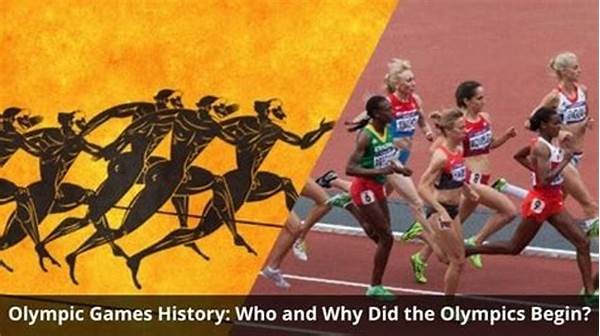History Of The Olympic Games And Their Evolution

History of the Olympic Games and Their Evolution
The Olympic Games have served as the ultimate stage for athletic prowess and a global platform for interconnectedness, where nations set aside their differences in the spirit of competition and unity. But how did these games transform from a mere religious festival in ancient Greece to the worldwide phenomenon they are today? The history of the Olympic Games and their evolution is not just a tale of sports; it’s a captivating story of innovation, tradition, and global unity that has unfolded over millennia.
Read More : Milestones In The Development Of Sports Equipment
Initially held in the ancient Greek city of Olympia, the Olympic Games began in 776 BC as a celebration honoring Zeus, the king of the Greek gods. The first festival was a one-day event with a single event—a footrace. Over the centuries, the games expanded to include events like wrestling, boxing, and chariot racing, becoming a significant part of Greek culture and identity. Athletes came from across the Greek world to showcase their skills and achieve glory in the eyes of Zeus and their peers.
Fast forward to 1896, the dawn of a new era. French educator Pierre de Coubertin revived the Olympics to foster international unity and peace. The inaugural modern Olympic Games were held in Athens, consisting of 280 participants from 13 countries. The games, initially held on a modest scale, have since exploded into a global spectacle with over 200 nations competing in over 400 events, witnessed by millions worldwide both in-person and via broadcast.
As impactful as the games themselves are the stories and breakthroughs off the field that have come to define their history. From Jesse Owens’ legendary four gold medals in the 1936 Berlin Games defying Nazi ideology to women participating in events, breaking gender barriers, the Olympic Games have often mirrored societal changes and challenges. Today, debates on sustainability, technology, and inclusivity continue to shape their narrative. This is the history of the Olympic Games and their evolution, an ever-evolving testament to excellence, perseverance, and the power of sport to inspire and unite.
The Evolution of Olympic Sports
Through the years, the Olympic Games have not only expanded in scale but have also adapted to incorporate new sports disciplines. This evolution is reflective of cultural shifts and technological advancements, ensuring the Olympics remain relevant and engaging for global audiences.
—
Discussion
The history of the Olympic Games and their evolution are not just confined to the pages of history books—they are a living, breathing chronicle that continues to evolve with each passing game. The discussion around its evolution raises intriguing points about its role in society and its potential future.
The Olympic Spirit: A Culture of Unity
The Olympic Games embody more than just competition; they represent the spirit of unity and camaraderie among nations. This has been particularly evident during turbulent times, serving as a reminder of what the world can achieve when collectively pursuing peace, excellence, and friendship. During recent events, debates have emerged around the cost and environmental impact of hosting the games, sparking discussions about sustainability and innovation in future events.
Future Opportunities and Challenges
Looking forward, the Olympics need to balance tradition with modernity. This means incorporating new sports that appeal to younger audiences, embracing digital advancements, and ensuring sustainable practices. Innovations such as virtual reality spectatorship and eco-friendly infrastructure are potential areas that could transform the Olympic experience without sacrificing its rich history.
Preserving the Legacy
Reflecting on the history of the Olympic Games and their evolution reveals both the challenges faced and the remarkable achievements gained. Preserving the legacy involves acknowledging the historical significance while adapting to a rapidly changing world. It’s not just about maintaining tradition but ensuring it resonates with future generations.
The Role of Technology in the Olympics
Read More : How To Defend Against An Opponent’s Smash Attack
Technology has dramatically influenced the way we experience the Olympics, from enhanced broadcasting to athlete performance tracking. The future of the games could see more tech integration, offering even more engaging experiences for viewers worldwide.
—
Actionable Steps
Explore the rich history and dynamic evolution of the Olympic Games with the following steps:
Introducing the Olympic Phenomenon
The Olympics are more than just games; they are an enduring phenomenon that transcends geographical, cultural, and political barriers. They have evolved from a simple festival honoring Greek gods to a global celebration of sportsmanship and excellence. This evolution underscores not just athletic advancement but also societal progress in inclusivity, technology, and international camaraderie.
Hosting the Olympics has become a symbol of national pride and a catalyst for economic and cultural growth. Each host city adds its unique flavor to the event, leveraging the opportunity to showcase its culture and innovations on an international stage. As a result, the Olympics continue to evolve, adapting to modern societal norms and technological capabilities while maintaining the essence of tradition that has been passed down through the ages. This evolution makes the history of the Olympic Games not just a story of sport but also a reflection of human progress.
Embracing Change: Olympics in the Modern Age
With new sporting disciplines and advancements in technology, the modern Olympics provide an enhanced experience that reaches far beyond the grandiose sporting arenas. As we look forward to future games, embracing change and innovation while cherishing its storied history will ensure that the Olympics remain an inspirational and unifying global spectacle for generations to come.
The Impact of the Olympics on Host Cities
Hosting the Olympics can have significant economic and cultural impacts on a host city, driving tourism, infrastructure development, and global attention. However, it also raises concerns about financial expenses and urban sustainability. The ongoing challenge is to ensure that these impacts are positive and sustainable, benefiting local communities long after the closing ceremony.
—



